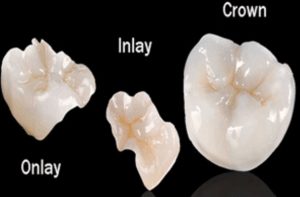Most people know what porcelain crowns are, but porcelain onlays are not as familiar. Porcelain crowns are used to preserve teeth that are damaged or compromised by large fillings or cavities so they do not fracture or break down further. Porcelain onlays are used for the same purpose, but they don’t cover the entire tooth.
Comparing Porcelain Crowns and Onlays

Porcelain Onlay Pros and Cons
Porcelain onlays preserve more natural tooth structure. While crowns can sometimes irritate the gums and even contribute to gum disease, onlays don’t extend that far. This also means that the margin where the porcelain meets the enamel is easy to see and keep clean with brushing. And onlays, being made entirely of porcelain, provide a very aesthetic result.
But porcelain onlays are not as strong as gold or porcelain-fused-to-metal crowns. And even though new ceramics and bonding technology provide extra strength, they can break, especially if they are not placed by a qualified cosmetic dentist who has studied the methods and technology required to obtain a good outcome. Dr. Dennis has the expertise, not only to place porcelain onlays, but to know which restoration technique is really called for in each situation.
You can learn more by reading about porcelain crowns. And if you’re ready to have Dr. Dennis help you decide which treatment will work best for you, request an appointment or give our office a call. We’ll be happy to help you select the most convenient time for your visit.